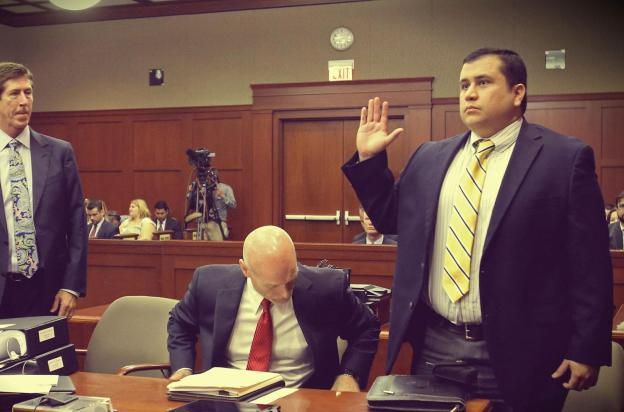 No matter where you stand on the acquittal of 29-year-old Florida man George Zimmerman, who shot and killed 17-year-old Trayvon Martin early last year, we can all agree that everyone would be better off had the tragic ordeal never happened. The Martin family has suffered unspeakable hardship. Zimmerman and his family have as well, if of a different kind. And now, our polarized nation has divided further over the ‘not guilty’ verdict. It’s a sad mess through and through.
No matter where you stand on the acquittal of 29-year-old Florida man George Zimmerman, who shot and killed 17-year-old Trayvon Martin early last year, we can all agree that everyone would be better off had the tragic ordeal never happened. The Martin family has suffered unspeakable hardship. Zimmerman and his family have as well, if of a different kind. And now, our polarized nation has divided further over the ‘not guilty’ verdict. It’s a sad mess through and through.
When I read the news of Zimmerman’s acquittal, after choking down a lump of disgust, a thought popped in my mind: The pointless, deadly Martin-Zimmerman encounter could have been avoided entirely if either party were wearing Google Glass on that fatal February day.
The primary narrative surrounding Google Glass, which packs a video camera and microphone, is that the device could wreak havoc on personal privacy, and increase the likelihood that what we do and say out in public and private could haunt us forever. These concerns are valid, but cram the concept of privacy into too small a box.
What has not been considered nearly loudly enough is how valuable a tool Glass would be for self-protection – in the moments when quick-fire video recording might prevent a crime, save your life, or at the very least act as a valuable eye witness.
Instead of a dead boy and a man whose life is forever marred by the life he took, we would have an intense YouTube video and nothing more.
Imagine for a moment that either Zimmerman or Martin had worn Google Glass when the two met. If one of them said, “Ok, Glass, record a video” at the start, the jury would have had irrefutable evidence of what happened – the key piece missing from the Zimmerman trial. As it stood in the courtroom, the only person who knows what truly happened between Zimmerman and Martin is the man who pulled the trigger. A single pair of Google Glass would have changed that fateful dynamic, and made clear Zimmerman’s decision to shoot Martin. The verdict – had Zimmerman gone to trial at all – would not be tainted with impassioned contention, as it is today.
More importantly, the inclusion of Glass in the Zimmerman-Martin confrontation may have prevented any violence at all. Assuming the prosecution’s version of the encounter is true – and that is an assumption – had Martin worn Glass and warned Zimmerman that he was being recorded, one can imagine how that could have caused Zimmerman to turn around rather than stand his ground. Instead of a dead boy and a man whose life is forever marred by the life he took, we would have an intense YouTube video and nothing more.
Because of Glass’ vast potential, we may see developers create Glass apps specifically for the purpose of self-protection. Apps, like Ustream or LiveCast, that allow users to automatically stream video to the Web could be custom tailored for someone under attack. Push notification functionality could send alerts to other users (including law enforcement) when a potential victim activates the app, helping to ensure that someone is watching your Internet-connected back. Glass could combine with fitness monitor technology to start recording the moment your heart rate jumps. Or, at the very least, it could call 911 with a quick voice command, alerting authorities to your whereabouts and predicament.
With tools like these enabled, one can imagine a day when this type of easy-recording, wearable technology becomes just as prevalent as dash cams are for Russian motorists.

The obvious downside here is that using Glass for self-defense, were it to become widespread, would turn society into even more of a surveillance state than it already is: A legion of shutter-happy Little Brothers. Random interactions with strangers could turn from passing encounters into police investigations. And lawsuits – good god, would there be lawsuits. We would have, in other words, precisely the type of nightmare anti-privacy scenario that so many fear – not because of random voyeurs attempting to catch people unaware (though we’d have to worry about them too) but because of righteous safety-freaks recording every interaction just in case.
But who knows? Glass may never catch on. It may lack the basic functionality (like not falling off your face the moment you start to run or scuffle) to make it a viable self-defense solution. Wearing Glass might even make you more of a target for thieving criminals, who could just snatch them off your face. But the frustrating ambiguity inherent in the Zimmerman case – ambiguity that could have been erased with a quick, simple, and hands-free video camera – makes it clear that justice has a weakness. And Google Glass might be the thing to fix it, for better or worse.
(Images © The New York Times and ABCnews.com. All Rights Reserved.)
Editors' Recommendations
- Have one of these Google Pixel phones? You’re getting Circle to Search
- Best Google Pixel deals: Save on Pixel 8, Pixel Buds, and Pixel Watch
- Does the Google Pixel 8 have wireless charging?
- Apple, Samsung, and Google could learn a lot from this unique phone
- Check your inbox — Google may have invited you to use Bard, its ChatGPT rival
